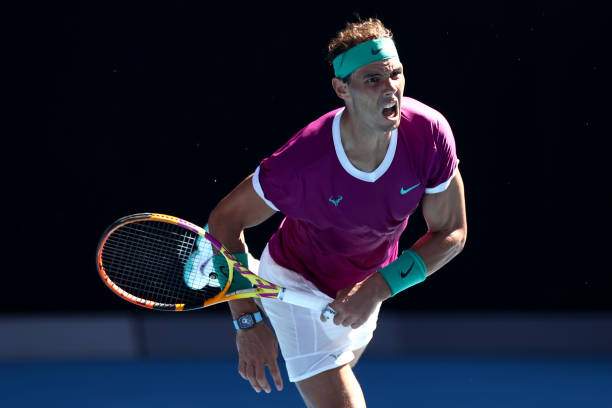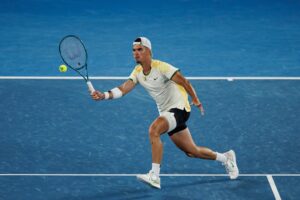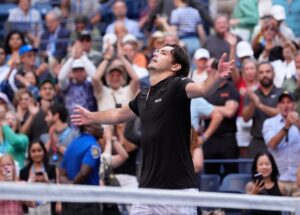Thanasi Kokkinakis looked bereft of energy as he limped out of the 2022 Australian Open against qualifier Yannick Hanfmann. The same Australian won his first ATP title in Adelaide on the Saturday before the Monday of the Hanfmann match. It appeared to be quite clear in the manner of the performance that winning his maiden title, or perhaps the celebrations afterwards, had an effect on his ability to bring his best game to court on the Monday.
Almost as further evidence, the Sydney champion from the same day, Aslan Karatsev, struggled to a five-set win over Jaume Munar, a match most would’ve expected him to win easier. The Russian hit over 100 unforced errors in the match. The finalists from Adelaide and Sydney were Arthur Rinderknech and Andy Murray. Both men had similar results to Karatsev, five set marathons in which they sneaked over line. In their cases, though, they had tough matches against Alexei Popyrin and Nikoloz Basilashvili, respectively.
Regardless, it has been a question that has divided tennis fans and players alike over the years. Is it better to come into a major tournament in form? Or does a run to the final in the week before a Grand Slam hinder your performance?
The Last Five Years on ATP Tour
Instead of taking another guess at the answer, perhaps there is a more scientific method to looking at this. Using the data from the ATP Tour over the last five seasons we can look at who the finalists were the week before a Grand Slam and check their performance in the tournament afterwards.

The gross data is presented as a table above. 35% of finalists in the tournament before the Grand Slam go out in the first round. 75% of players go out in the opening three rounds.
[pickup_prop id=”18832″]
This seems like it may back up the theory that finalists the week before struggle to repeat their high-level performances in a best-of-five match a few days later. The confidence and form that they surely have doesn’t compensate for the physical and mental exertions of the tournament before.
However, it may well be that the finalists in these tournaments are actually not that good in a Grand Slam context. The top players don’t often play these events, and so the champions and finalists are often players you may expect to go out early in a Grand Slam. So using this context we can look deeper into this phenomenon to produce more meaningful results.

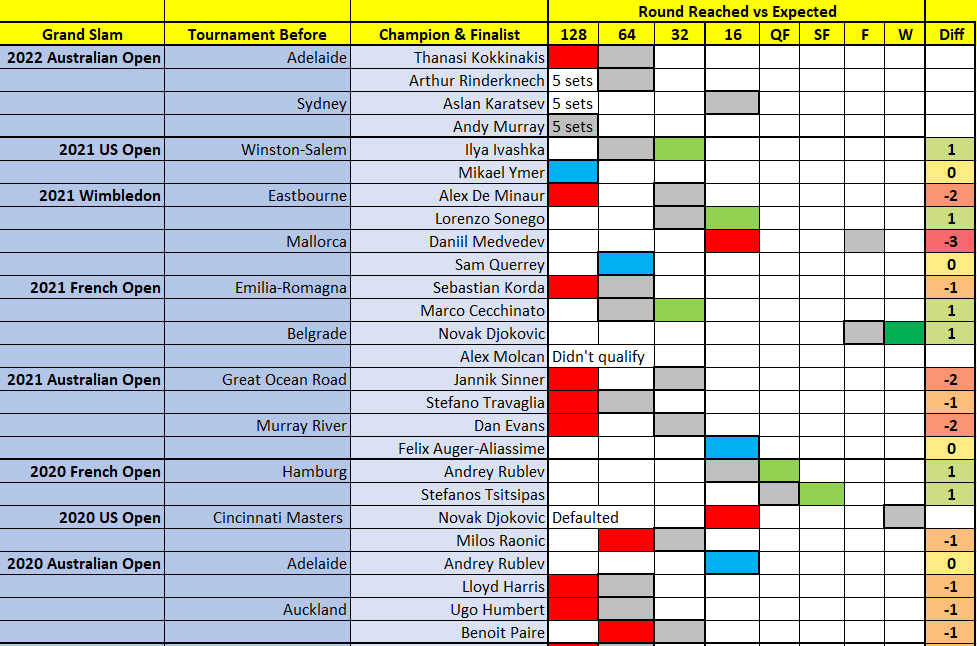
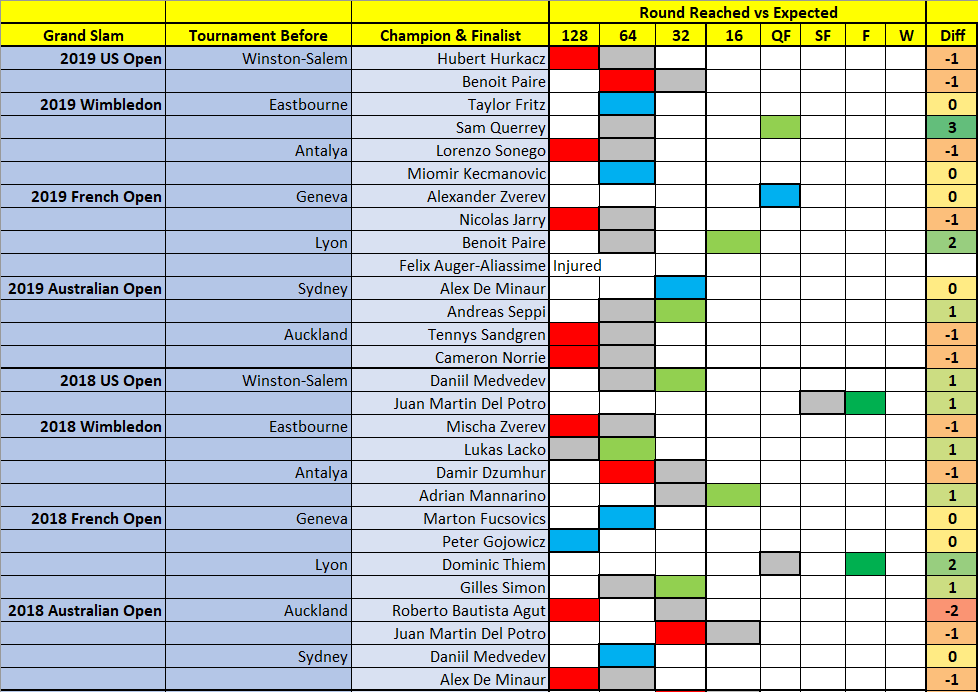
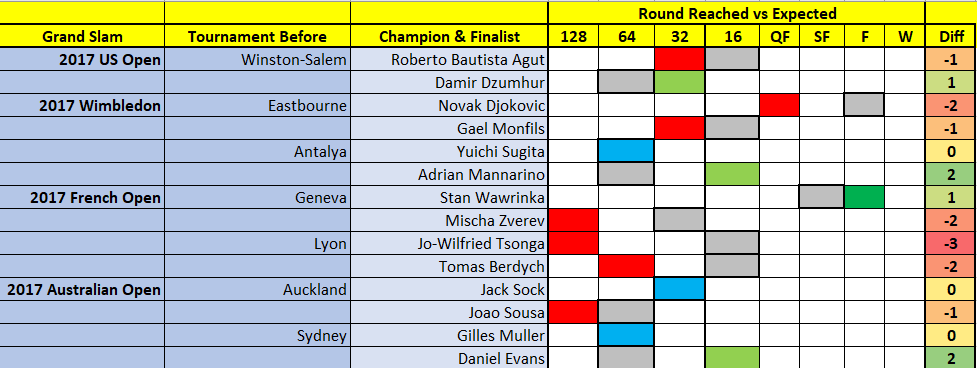
There is a lot of data to take in there so I have produced a summary to make it easier to digest.
30 out of 60 players underperformed what they should have done according to their seeding/ranking.
19 out of 60 players overperformed.
In total, across the 60 instances in the data, the “round difference” was -14. In other words, across the whole cohort of players the number of rounds by which they underperformed was 14. That’s an average of 0.22 rounds per player.
Only one player went on to win the title. Interestingly, it was Novak Djokovic’s 2021 French Open win. Much was discussed at the time whether it was a positive or a negative that he played the week before, as the Serbian isn’t usually one to do that. This also goes to prove that it isn’t always a negative to have a deep run the week before. Indeed, it is often the “natural” surfaces that require that extra time to get into the groove of. Sam Querrey’s excellent 2019 Wimbledon run is an obvious example of that.
Can this information be used?
Players and their teams that are planning their schedules may find this of interest. If you have ambitions of doing particularly well in the Slams then you may think twice about entering a tournament the week before. It may also affect the players who complete tournaments in the week before. Already it is fairly common to see some players withdraw during the tournament the week before a Major event.
It may also be used by fans, commentators, and even gamblers to further educate themselves about the effects of playing the week before. Whether there is a real advantage to be gained in terms of an edge would require further investigation.
Ideas for further investigation
Ideally one would look deeper into each individual case. It may well be that some players got an unlucky draw, some may have picked up a freak injury or there may have been other reasons for their failure in the Grand Slam.
Also, 60 events is still a relatively small sample. There are plenty more historical examples out there to build a more robust model. Also, to make it truly universal it would be better to include WTA events in the study.
Main Photo from Getty.


